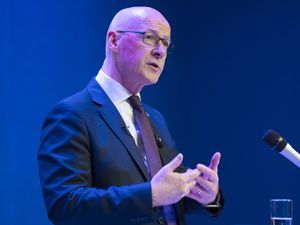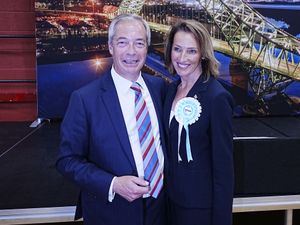Cutting waiting lists to be ‘first step’ of Labour government’s NHS plan
The latest figures show 7.54 million treatments were waiting to be carried out at the end of March, relating to 6.29 million patients.
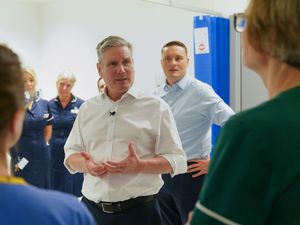
Cutting NHS waiting lists will be “the first step” in a Labour government’s plan to get the health service “back on its feet”, Sir Keir Starmer has said.
The opposition leader pledged to create a health service that is “there for everyone” ahead of a visit to the West Midlands.
If it wins the General Election, Labour will initially focus on reducing treatment backlogs, which currently stand at 7.54 million.
The party claims the figure could rise to 10 million if the Conservatives are in office for another five years.
Labour’s first step would be to create an additional 40,000 appointments, scans and operations each week during evenings and weekends.
It also vowed to double the numbers of scanners in a bid to diagnose patients earlier.
The Labour leader also pledged to send “crack teams” who are already running out-of-hours programmes into hospitals to help set up evening and weekend clinics in the rest of the health service.
Sir Keir said: “Putting the NHS back in its feet and making fit for the future is personal for me.
“It runs through my family like a stick of rock, which is why one of my five missions is to turn it around after 14 years of Conservative decline.
“The first step of my Labour government will be to cut NHS waiting lists, clearing the Tory backlog.”
The plans for additional appointments and scanners will cost about £1.3 billion, according to Labour.
The party said it will fund them by clamping down on tax dodgers and tightening up the rules on non-domiciled people.
Elsewhere, Labour vowed to utilise spare capacity in the private sector, which will be free of charge to NHS patients, as well as reforming the health service and expanding the workforce.
Sir Keir added: “We will roll up our sleeves to work with NHS staff, not against them. We will stop the anxiety of wondering if an ambulance will come on time. We will bring back the family doctor.
“The NHS has been there for my family when we needed it. I’ll make sure it’s there for everyone.”
The Labour leader said he was inspired by Guy’s and St Thomas’ Hospital, where staff had high-intensity theatre lists on weekends up and running within six weeks.
He said: “It was NHS staff working in the hospital I can see from my office in Parliament who led the way on this new model.
“Labour will take the best of the NHS to the rest of the NHS, so patients in every part of the country can be treated on time.”
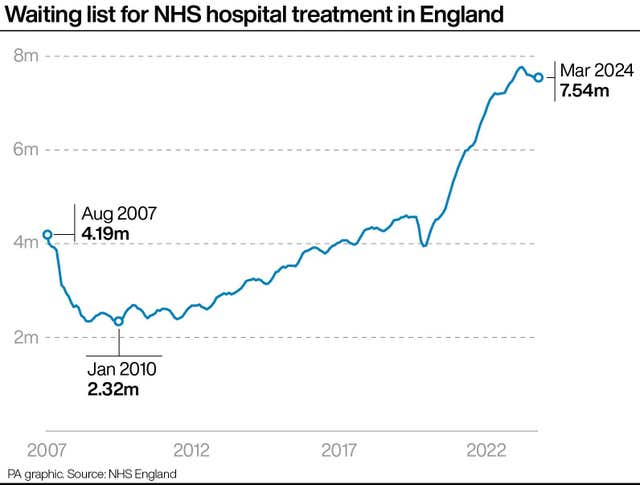
Kathryn Marszalek, senior analytical manager at the Health Foundation, warned tackling waiting lists through weekend and evening work “must not come at a cost to staff wellbeing”.
She also called on the next government to “provide stable, long-term investment to meet the high demand for both hospital and primary care”.
Earlier this month, figures from NHS England revealed the size of the waiting list for routine hospital treatment in England was unchanged in March, following five consecutive monthly falls.
An estimated 7.54 million treatments were waiting to be carried out at the end of March, relating to 6.29 million patients, the same numbers as in February.
However, some 309,300 patients had been waiting more than 52 weeks to start routine hospital treatment, up from 305,050.
The number of people waiting more than 65 weeks to start treatment fell from 75,004 to 48,968.
The Government and NHS England had pledged to eliminate all waits of more than a year by March 2025, while the target to eliminate all waits of more than 65 weeks has been moved to September 2024, having previously been March 2024.
The party highlighted that Tony Blair’s Labour government cut maximum waiting times from 18 months to 18 weeks.
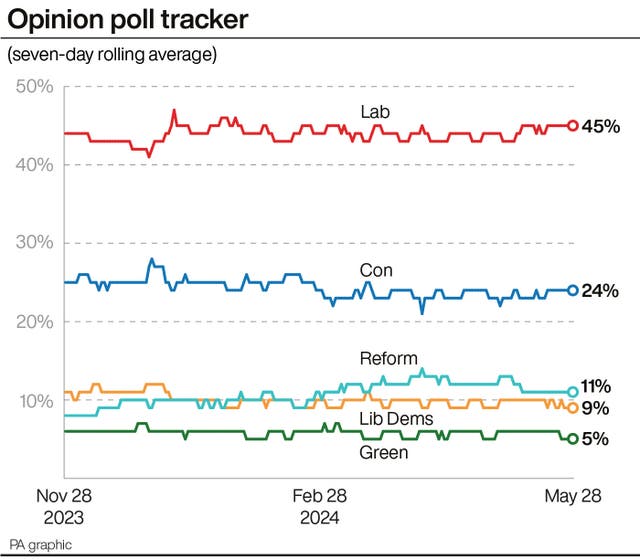
Shadow health secretary Wes Streeting said: “Over 14 years the Conservatives have taken the golden inheritance left by the last Labour government and wrecked it.
“Their neglect, incompetence and underinvestment in the NHS has left millions of people waiting in pain and agony.”
He accused Prime Minister Rishi Sunak of having “given up on the NHS” with “no plan to turn this crisis around”.
“Patients deserve solutions not scapegoats,” Mr Streeting added.
However, Health Secretary Victoria Atkins described the plans as “more ‘copy and paste’ politics from Labour, who have no plan”.
“Last week we exposed Labour’s ‘no new hospitals’ pledge, in which they have said they will delay the Government’s building programme for new hospitals,” she added.
Ms Atkins said the health service “has faced unprecedented challenges which it can only overcome if supported by a strong economy”.
She insisted the Conservatives “have a clear plan and will take bold action to strengthen the economy and continue to deliver the technology and innovation the NHS needs to keep cutting waiting lists”.
Thea Stein, chief executive of think tank the Nuffield Trust, welcomed Labour’s focus on waiting lists, but warned the estimated £1.3 billion will “cover only a limited amount of extra care”.
“Labour is right to focus on waiting lists, where progress has been slow and our analysis of the British Social Attitudes survey shows public concern is very high.
“We support the intention to spend more money on equipment, historically the victim of short-termism.
“However, the sum of money they are proposing will cover only a limited amount of extra care, not enough for a rapid or sudden improvement.
“It is unclear how more private sector capacity could be used without additional funding – or how much capacity there is left after rapid recent increases in reliance upon it.
“The problem of NHS productivity, which has fallen for complex reasons since the Covid-19 pandemic and which needs careful national leadership to tackle, also needs to be more of a priority.”
Sarah Woolnough, chief executive of The King’s Fund, said plans to tackle the backlog in five years “would almost certainly require a swift resolution to ongoing industrial action”.
She added: “Addressing long waits for care will also need greater government focus on preventing ill health in the first place, and crucially, shifting more care outside of hospitals into the community so people’s conditions can be managed without the need for acute care.”
The Institute for Fiscal Studies said Labour’s pledge to clear waits of more than 18 weeks within five years would be “highly stretching”.
IFS research economist Max Warner said: “Big reductions in waiting times were made by previous Labour governments but these were alongside large increases in health spending – increases of over 7% a year in real terms.
“The challenging fiscal situation facing the next government will make it incredibly difficult to increase health spending at anywhere near similar rates, and will make achieving this commitment much harder.”


